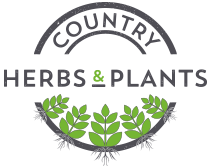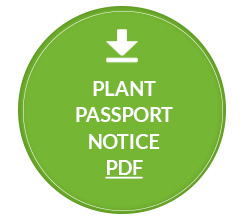Plant Health & Environmental
PLANT PASSPORT UPDATE JANUARY 2023:
Here at Country Herbs & Plants we have been working closely with Plant Health and are pleased to announce that we are compliant with current regulations as follows:
- At present we are permitted to issue a multi genus plant passport reference document in the plant passport format on the end of every trolley (We have added this new feature to our delivery notes)
- Legislation states at present this is compliant enough however, to help our customers we are also attaching a tray end label in the plant passport format to every tray.
- We are also currently working on our plant passport being on each individual care card going forward for the future.
We Hope this clarifies any questions you may have and we are keeping updated with any changes!
Xylella and Neonicotinoids are both major conversation points at the present we have decided to let all of our customers know how we stand on both topics.
Xylella
We do source some of our young plants from outside the UK. These come from continents that are non Xylella demarcated.
These plants are purchased as young plug plants which will be grown on at our nursery for several months. We DO NOT trade any plants.
In summary We DO NOT purchase ANY plant material from infected areas. We DO NOT trade any plants and we have regular plant inspections by Animal & Plant Health Agency. All plants that we sell are accompanied by a plant passport.
Neonicotinoids
We are NOT using Neonicotinoids on ANY of our garden plants and will NOT be in the future.
One of our young plant suppliers, based in Israel, may, under exceptional circumstances use a neonicotinoid up to twice a year if they have a particular issue but these sprays are used inside a glasshouse so there is no danger of drift into the environment. They are currently working on finding alternatives.
Friends of the Earth bee campaigner Nick Rau said: “We’re aware there are supply chain issues to resolve, such as plug plants originating from Israel, Colombia, Kenya or wherever, and this will take time to sort out.”
Our garden plants are free of UK applied Neonicotinoids.
Biological Controls
In recent years we have been using ever fewer chemicals on our nursery. This is continuing for the 2018 season with our integrated pest management plan using a vast majority of biological controls. Our aim is of course to send out pest free plants but we also hope that retailers and end consumers will recognise that more environmentally friendly sustainable production techniques sometimes are not quite as effective as the old fashioned chemical approach and the occasional aphid might be found. We hope people can be realistic in this respect.
Our Contribution to the Environment
We pride ourselves on being environmentally friendly. We work closely with a local recycling company who take away all or polythene and film, cardboard PE plastic and PS plastics. Our general waste is also sorted by a company who send nothing to landfill. Waste plants are composted. We are also 20% peat reduced.
From the HTA – Let’s get our local council to take action – Recyclable plant pots – ask your council to pick them up!
The HTA has written an amendable template letter for you to send to your local councillor asking for the new recyclable plant pots to be collected by your council for recycling.
The letter is written from you as a local resident and/or as a local business owner. It doesn’t necessarily matter whether you send it from personal perspective or as a business, the objective is to highlight the lack of kerbside collections for plant pots by Local Authorities and to get councillors looking into the subject matter.
You can download the letter here. You are welcome to amend the letter in any way you see fit – you can add in or take out content.
It’s worth noting that 40 Local Authorities out of the 408 in the UK collect plant pots already (source RECOUP’s Household Plastic Collections Survey 2019). If you’re not sure if your Local Authority collects or not please email policy@hta.org.uk with the name of your council and we will tell you if they are on our list or not.
Below are step by step instructions on what to do with the letter:
1. Find out the name of your local district councillor. You can do this by going to https://www.gov.uk/find-your-local-councillors and typing in your home or business postcode. This will take you to the district council’s webpage detailing your local councillors. You need to find the councillor that covers your chosen postcode (called a ward). Sometimes council websites give direct contact details for councillors, others just ask communication to be sent centrally to the council.
2. Open the document and amend the letter accordingly, inserting the correct details where indicated (in red, in brackets). As it’s a personal letter from you, not from the HTA, you can change the letter to suit your personal circumstances if you wish. Don’t forget to include your own contact details.
3. Feel free to share the letter with other employees within the business, or anyone else involved in horticulture. The more letters your local councillor gets, the more likely the profile of this issue will be raised at authority level.
4. Print, sign and post or e-mail the letter. We would recommend not emailing to a central ‘info@’ type email address. Try to find a direct councillors e-mail if possible.
5. Inform the HTA you have sent your letter by emailing policy@hta.org.uk and letting us know when and to whom it was sent.
6. If you receive a response, please forward to policy@hta.org.uk the HTA will be coordinating responses and reporting back on outcomes. If your councillor asks for further information, you can direct them to the HTA webpage, you can also give them the policy@hta.org.uk email address.
7. If you don’t receive a response by the end of February 2020 please let the HTA know.
Our Pot and Tray recycling Policy
Sustainability is very much in mind for all of us at this time and we are very committed to making our practices as green as possible. To this end, we have, in recent times installed biomass heating, recycle our roof water, have moved to recyclable taupe pots and trays, use mainly bio-pesticides and grow in a reduced peat media with a view to becoming peat free.
Whilst sustainability has arguably been in the spotlight of late the issue of Xylella and biosecurity in general remain very real risks to our industry and our nursery as a production unit. For this reason we believe the biosecurity risks are currently too great for us to accept tray returns from our customers.
Aside from this, we do some deliveries ourselves but also use third party hauliers. They collect from us, exchange empty trolleys then go on their way. The logistical headaches and cost of them delivering trays back would be huge.
We hope you can appreciate our stance.
From conversations with a few other Garden Centres we understand some use local recycling companies who take several pallets of plastics, card and even film waste away at a time. They don’t receive money for the waste but equally don’t pay anything either.



